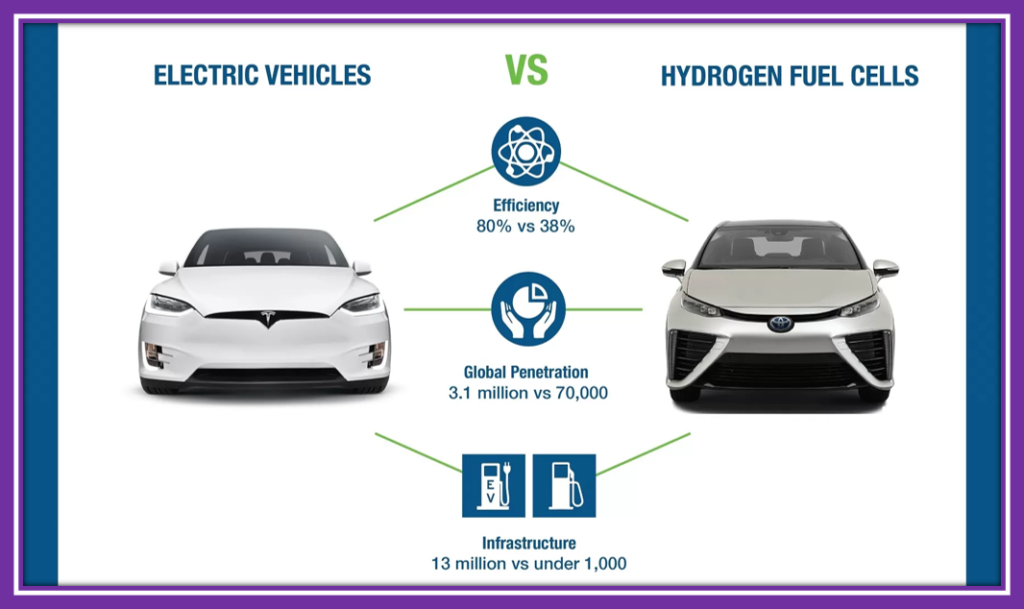
As the world increasingly seeks to move away from traditional fossil fuels, two major contenders for the title of the “car of the future” are hydrogen fuel cell vehicles and electric vehicles. While both options represent a significant shift towards cleaner and more sustainable transportation, each technology comes with its own set of advantages and disadvantages. Here’s a closer look at the pros and cons of hydrogen fuel cell vehicles and electric vehicles:
Hydrogen Fuel Cell Vehicles
A hydrogen fuel cell vehicle (FCV) generates electricity by combining hydrogen fuel and oxygen from the air. The electricity produced powers an electric motor, providing propulsion for the vehicle. Here are some of the advantages and disadvantages of FCVs:
Advantages:
- Zero Emissions: Hydrogen fuel cell vehicles emit only water vapor and heat as byproducts, making them a zero-emission option.
- Long Driving Range: FCVs typically have longer driving ranges than battery electric vehicles (BEVs) and can be refueled in just a few minutes, similar to refueling a gasoline-powered car.
- Fast Refueling: Refueling a hydrogen fuel cell vehicle takes just a few minutes, similar to refueling a gasoline-powered car, whereas electric vehicles can take several hours to recharge.
Disadvantages:
- Limited Refueling Infrastructure: The hydrogen refueling infrastructure is currently limited, making it difficult to refuel a hydrogen fuel cell vehicle outside of certain geographic areas.
- High Cost: Hydrogen fuel cell vehicles are currently more expensive than battery electric vehicles, although costs are expected to come down over time.
- Limited Model Availability: Currently, there are only a few models of hydrogen fuel cell vehicles available on the market.
Electric Vehicles
Electric vehicles (EVs) are powered by an electric motor and a battery that stores energy. When the battery is depleted, the car must be recharged to continue driving. Here are some of the advantages and disadvantages of electric vehicles:
Advantages:
- Zero Emissions: Battery electric vehicles produce no tailpipe emissions, making them a zero-emission option.
- Low Operating Costs: Electric vehicles have lower operating costs than gasoline or diesel vehicles because electricity is cheaper than gasoline or diesel fuel.
- Widespread Availability: There are many models of electric vehicles available on the market, and the infrastructure for charging electric vehicles is growing rapidly.
Disadvantages:
- Limited Driving Range: Battery electric vehicles have a limited driving range compared to hydrogen fuel cell vehicles and can take several hours to recharge.
- Long Recharging Time: Recharging an electric vehicle can take several hours, although this can be mitigated by using fast charging stations.
- Battery Degradation: Over time, the performance of the battery in an electric vehicle can degrade, reducing the vehicle’s driving range.
Conclusion:
Both hydrogen fuel cell vehicles and electric vehicles offer significant advantages over traditional gasoline or diesel vehicles. However, each technology comes with its own set of advantages and disadvantages, and the best choice for any given driver depends on a variety of factors, including driving habits, access to refueling infrastructure, and purchase price. As both technologies continue to evolve and improve, it is likely that both hydrogen fuel cell vehicles and electric vehicles will play an increasingly important role in the future of transportation.
_______________ XXXXX ______________
Note: Above views are purely written based on my own individual experience through various industries & based on that above points have been came out. Also gone through various books & Reference sites before conclude. Hence before implementing, pls. review & decide whether it suits/align to your requirements or not.








